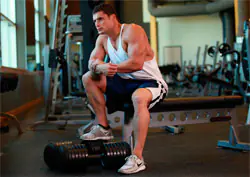We welcome you, our dear readers of the site “fitness and bodybuilding in Russian”. In our articles, we have repeatedly drawn your attention to the fact that self-control of those engaged in physical exercises and sports is actually an integral part of the training process.
And not just a part, but perhaps the most important part, because triple your health you won't buy it. And if you undermine your health, you will no longer need any training. Many novice athletes involved in iron sports underestimate importance At this point, they treat this issue carelessly, and in vain...
Before moving on to self-study fitness and bodybuilding, consult your doctor and get his permission. Subsequently, you should regularly, at least once a year, undergo medical examinations. Current observations of the level of your health, physical development and degree of preparedness can be carried out by mastering basic self-control techniques and methods for assessing the obtained indicators.
The latter can be divided into two subgroups - subjective And objective.
The first, subjective indicators include:
- well-being,
- dream,
- appetite,
- degree of fatigue,
- desire to continue to exercise,
- and etc.
If after each workout it is difficult to fall asleep and sleep is restless, the loads do not correspond to your state of health, fitness, gender and age.
Food should be taken no earlier than half an hour/hour after exercise, and to quench your thirst you can drink no more than one glass of mineral water or tea.
Well-being after classes you should be cheerful, and therefore in a good mood. If you experience a headache, a feeling of weakness and severe fatigue, lethargy, drowsiness, irritability, or muscle pain, stop training. If you feel worse, sleep or appetite worsen, you should reduce your exercise, and if your condition worsens again, you should consult a doctor.
Objective indicators of self-control are conventionally divided into four main groups:
- Indicators of physical development (somatometric signs) – a) length, b) body weight, c) chest circumference, etc.
- Functional indicators (physiometric signs) - a) heart rate (or more simply - pulse), b) blood pressure, c) respiratory rate, d) Vital capacity - vital capacity of the lungs (so-called spirometry), e) muscle strength (wrist dynamometry) and etc.
- Indicators of physical fitness (level of development of physical qualities) - a) endurance, b) strength, c) speed, d) flexibility, e) agility, f) speed-strength qualities, etc.
- Indicators of physical condition - include a comprehensive assessment of the totality of indicators of physical development and the level of physical fitness of those involved in sports.



